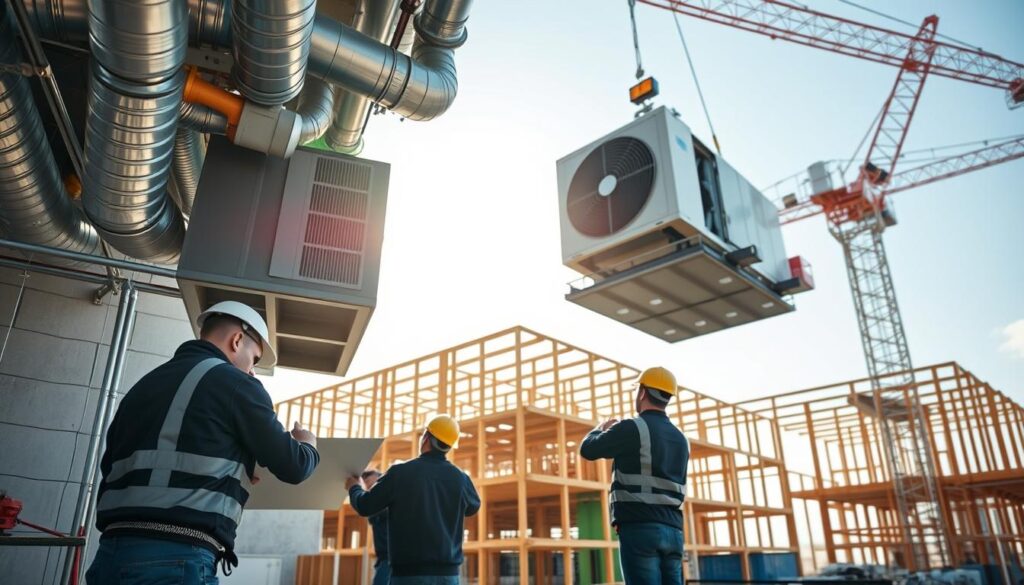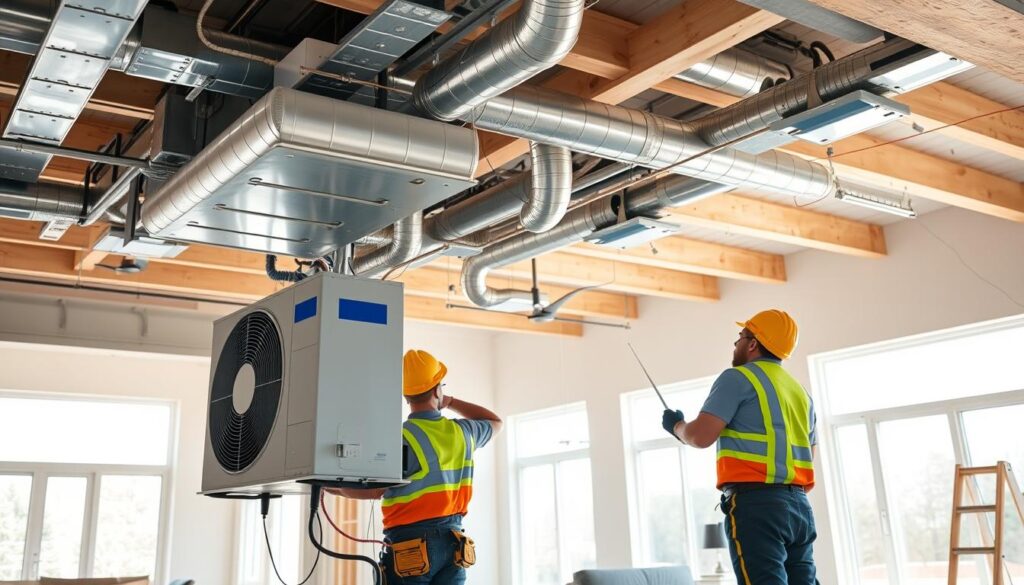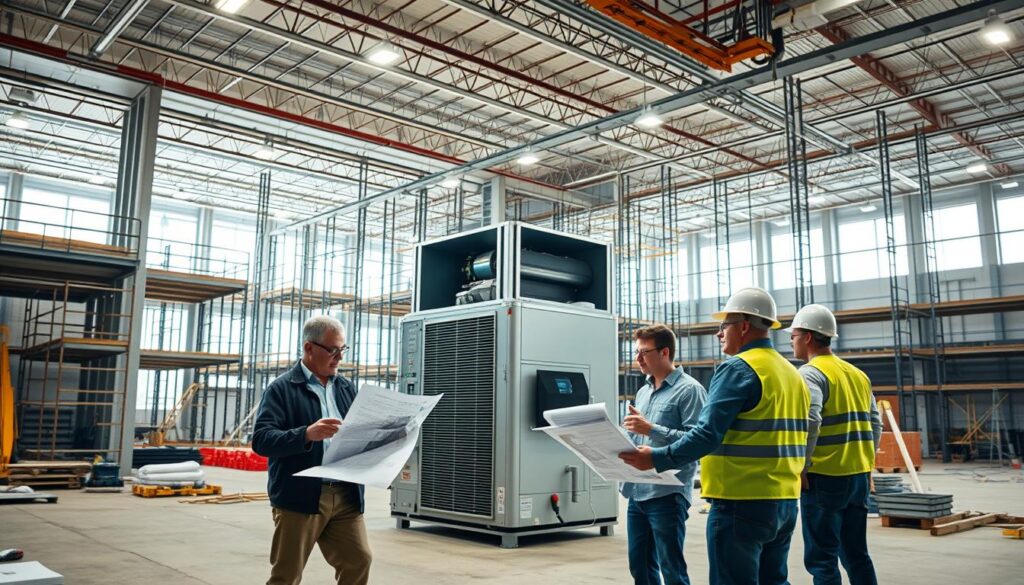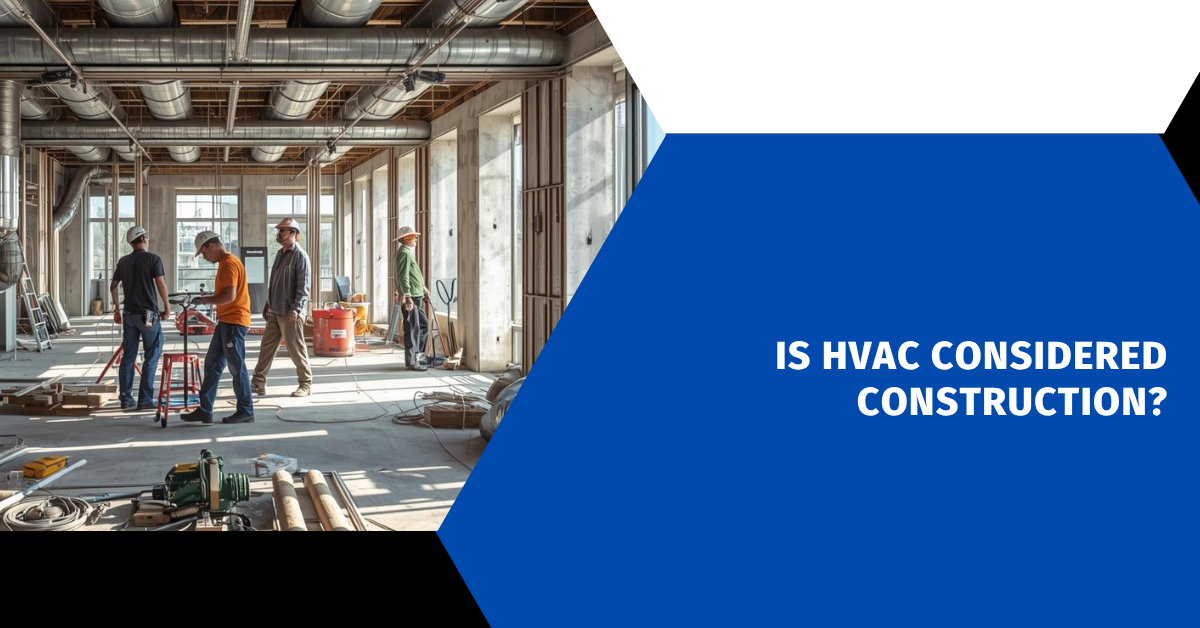Affiliate Disclosure
HVAC Guide Guys is a participant in the Amazon Services LLC Associates Program, an affiliate advertising program designed to provide a means for sites to earn advertising fees by advertising and linking to Amazon.
Is HVAC Considered Construction? Ever thought about if HVAC work is part of traditional construction? The connection between HVAC systems and construction is more complex than many think. As buildings get more advanced, the difference between HVAC services and construction trades gets smaller.

HVAC is more than just installing systems. It’s a specialized field that makes buildings comfortable and efficient. HVAC experts are key in making homes and businesses better places to be. To understand the link between HVAC and construction, we need to look closer at their roles.
This article will dive into the details of HVAC and construction. We’ll see the special skills, technologies, and knowledge needed in this field. You’ll learn how HVAC experts help create better environments, going beyond what traditional construction does.
Key Takeaways
- HVAC is closely linked to the construction industry
- Specialized skills differentiate HVAC from traditional construction
- HVAC professionals require unique technical knowledge
- Technology plays a critical role in modern HVAC systems
- Licensing and certifications are essential in HVAC work
Table of Contents
Understanding HVAC Systems and Their Core Components
HVAC systems are key to keeping buildings comfortable. They control temperature, air quality, and ventilation. This is true for homes, offices, and factories.
Looking into HVAC building codes, you’ll see many parts working together. These parts are vital for managing the climate. The construction industry has specific classifications for these components:
- Heating Units: Furnaces and heat exchangers
- Cooling Units: Air conditioners and refrigeration systems
- Ventilation Systems: Ductwork and air circulation mechanisms
- Control Mechanisms: Thermostats and digital control panels
Essential HVAC System Elements
Every HVAC system has special parts for managing indoor climate. Compressors, fans, and heat exchangers are the main parts. They move heat and air around.
Modern HVAC Technology Integration
Today’s HVAC tech includes smart sensors and energy-saving parts. These advancements help control temperature better, use less energy, and improve system performance.
System Operation Fundamentals
HVAC systems work by moving heat, air, and sensing the environment. Technicians know how to keep indoor spaces comfortable and safe. This is true for different types of buildings.
Explore Our HVAC Shop
Looking for top-rated HVAC tools, parts, and accessories? Visit our shop and find the perfect solution for your needs.
Visit the ShopDefining Construction Industry Scope and Activities
The construction industry is vast, covering many specialized tasks that shape our world. When we look into HVAC classifications in construction, we see a complex web of experts. They turn architectural dreams into real, working spaces.
- New building development
- Infrastructure creation
- Renovation and restoration projects
- Mechanical systems installation
Mechanical contractors have a special role in construction. They are different from regular construction workers. They focus on installing and keeping up complex systems that make buildings work.
“Construction is not just about creating structures, but about engineering solutions that improve human environments.”
Understanding construction means seeing how different trades work together. HVAC experts, electrical engineers, plumbers, and structural contractors all play a part. They bring their unique skills to make sure buildings are safe, efficient, and comfy.
Construction work needs careful planning, advanced skills, and a deep understanding of building systems. Whether it’s a small home fix or a big commercial project, construction pros make ideas real and useful.
Is HVAC Considered Construction?
The relationship between HVAC and construction is complex. HVAC is seen as a construction trade but has its own special traits. These traits help us understand how HVAC workers fit into the construction world.
Unique Characteristics of HVAC in Construction
HVAC requires special skills and technical knowledge. It’s different from regular construction work. HVAC technicians need their own training and certifications.
- Specialized technical knowledge
- Advanced system installation skills
- Precise mechanical engineering understanding
- Complex equipment management
Key Differences from Traditional Construction
HVAC work and traditional construction differ in many ways. HVAC focuses on quick repairs and maintenance. This is unlike general construction, which has longer timelines.
| HVAC Characteristics | Traditional Construction Features |
|---|---|
| Emergency service focus | Planned project completion |
| Specialized technical skills | Broader building construction skills |
| Rapid response requirements | Structured project management |
Licensing and Professional Requirements
HVAC workers need specific certifications. These show they know a lot about mechanical systems. They also need to keep learning and getting better at their job.
“HVAC is not just a job, it’s a specialized construction trade requiring continuous learning and technical proficiency.” – HVAC Industry Expert
Even though HVAC is part of construction, it’s a unique area. It has its own challenges, skills, and expectations. Knowing this helps us see how important HVAC technicians are in making spaces comfortable and functional.
Explore Our HVAC Shop
Looking for top-rated HVAC tools, parts, and accessories? Visit our shop and find the perfect solution for your needs.
Visit the ShopThe Role of HVAC in New Construction Projects

When starting new construction, HVAC is key to the building’s design. It’s vital to integrate heating, ventilation, and air conditioning systems early on. This ensures your project’s success.
Planning HVAC for new construction needs careful thought. Architects and engineers must work together. They design systems that fit the building’s needs. Important factors include:
- Building size and layout
- Energy efficiency goals
- Climate and regional environmental conditions
- Future scalability of the HVAC system
Commercial HVAC projects are more complex. They need detailed planning for best performance and cost. You must consider:
- Precise equipment sizing
- Ductwork design and routing
- Ventilation requirements
- Zoning and temperature control mechanisms
Today’s HVAC systems use advanced tech. Smart sensors, programmable thermostats, and energy management systems make buildings smarter. They adjust to changing needs.
Effective HVAC installation in new construction is not just about temperature regulation—it’s about creating sustainable, comfortable spaces that adapt to changing needs.
Investing in professional HVAC planning boosts your building’s performance and comfort. It also saves energy in the long run.
HVAC Installation vs. Construction Timeline Differences
Timing is key in construction phase HVAC work. Trane construction services know HVAC installations are different. They are faster, more urgent, and need careful planning.
HVAC systems need special scheduling. They are critical for heating and cooling. This requires quick planning and action.
Emergency Services and Response Needs
HVAC work has its own timeline. Your HVAC system can’t wait for repairs. Important factors include:
- Quick response to failures
- Health and safety risks from broken systems
- Fast diagnosis and fixes
Project Planning and Scheduling Dynamics
Good HVAC work needs careful planning. Trane construction services are great at planning. They make schedules that work well and don’t disrupt much.
- Full site check
- Right equipment size
- Clear installation plan
- Testing and setup after
Coordinating with Other Construction Trades
For HVAC to work well, it must work with other trades. Your project’s success relies on:
- Good communication with electrical, structural, and mechanical teams
- Working together smoothly
- Flexible schedules
Modern HVAC construction is all about precise timing and teamwork. It ensures your system works great and you’re happy.
Explore Our HVAC Shop
Looking for top-rated HVAC tools, parts, and accessories? Visit our shop and find the perfect solution for your needs.
Visit the ShopMechanical Systems vs. HVAC: Understanding the Distinction
In the construction world, knowing the difference between mechanical systems and HVAC is key. Mechanical contractors are essential for building a solid foundation. They do more than just handle heating and cooling.
HVAC is just a part of a bigger picture in the construction industry. Mechanical systems include many important parts:
- Plumbing networks
- Fire protection systems
- Elevator mechanisms
- Gas line installations
- Piping infrastructure
- Power generation equipment
HVAC experts focus on keeping temperatures right and air clean. But mechanical contractors handle a wider range of systems. They make sure buildings work well and are safe.
| Mechanical Systems | HVAC Specific Focus |
|---|---|
| Comprehensive building infrastructure | Temperature and air quality control |
| Multiple system integrations | Specialized climate management |
| Broader technical expertise | Narrow environmental systems |
Knowing these differences helps everyone see the hard work needed for buildings to be comfortable and functional. Mechanical contractors are the backbone of modern buildings. They make sure all systems work together smoothly.
Building Codes and Permit Requirements for HVAC Work
Understanding building codes for HVAC systems can be tough. It’s key to know about hvac permit requirements. This ensures your heating, ventilation, and air conditioning work is safe and follows the rules.
When you start an HVAC project, local rules are very important. They decide what you can do and how you can do it. Each place has its own rules you must follow.
Key Compliance Considerations
- Get the right permits before you start HVAC work
- Make sure your installations follow current building codes
- Book inspections at key project points
- Work with HVAC pros who are licensed and certified
Safety Standards and Documentation
Every HVAC job needs special documents to show it follows local building codes. Your project will need:
- Clear system design plans
- Details on the equipment
- Energy efficiency figures
- Info on the contractor’s license
Pro tip: Always check with your local building department to understand specific hvac permit requirements in your area.
Inspection Process
Inspections check if your HVAC system is safe and works well. They look at electrical connections, how refrigerant is handled, ductwork, and how the system works overall.
Explore Our HVAC Shop
Looking for top-rated HVAC tools, parts, and accessories? Visit our shop and find the perfect solution for your needs.
Visit the ShopCommercial HVAC Construction Projects and Specifications

Commercial HVAC projects are complex and key to building infrastructure. They need advanced engineering and precise setup. Trane construction services offer top-notch HVAC solutions for big commercial spaces.
Several important factors come up in commercial HVAC projects:
- Advanced system design needs
- Energy efficiency is key
- Scalable tech integration is needed
- Strict building codes must be followed
Commercial HVAC systems have different specs than home setups. Precision engineering is essential for keeping temperature, humidity, and air quality steady in large areas.
| Project Specification | Commercial HVAC Requirements |
|---|---|
| System Complexity | Multi-zone temperature control |
| Energy Efficiency | LEED certification standards |
| Technology Integration | Smart monitoring and control systems |
| Scalability | Modular design adaptability |
Experts in commercial HVAC face tough design challenges. Trane construction services use the latest tech for the best system performance. They tackle unique architectural and environmental needs.
“Successful commercial HVAC installations combine technical expertise with innovative engineering solutions.”
Your commercial building’s comfort and efficiency rely on careful HVAC system planning and expert setup.
Conclusion
Exploring if HVAC is considered construction shows it’s complex. HVAC is a specialized trade that adds essential mechanical systems to buildings. It’s important to see its unique role in construction.
HVAC professionals have skills that go beyond regular construction. The question of whether HVAC is construction is more than simple. It involves deep technical knowledge, following rules, and fitting systems together perfectly. They deal with complex codes, safety rules, and new tech.
The role of HVAC in construction is growing. New tech like smart homes, energy-saving designs, and better climate control are changing the field. Knowing about these changes helps us see how HVAC is evolving.
HVAC is where engineering, technical skills, and construction meet. Whether it’s for big commercial projects or homes, HVAC experts are key. They help make spaces comfortable, useful, and green across the U.S.

